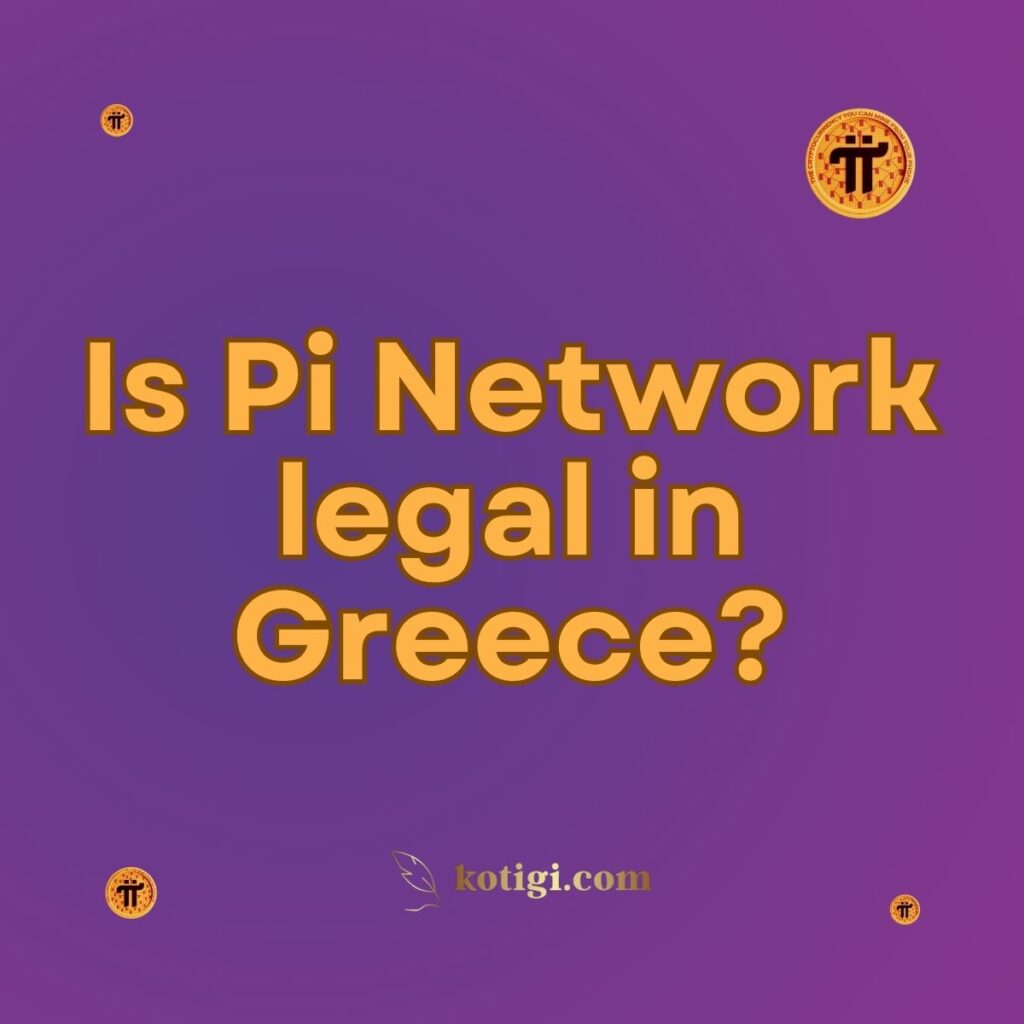
Is Pi Network legal in Greece?
Yes, Pi Network is legal in Greece. There are no specific laws banning its use, though users must comply with general cryptocurrency regulations and follow any updates from Greek authorities regarding digital currencies.
Introduction
Pi Network, a growing cryptocurrency ecosystem that allows users to mine Pi tokens using their mobile devices, has gained significant attention globally. As Pi’s popularity spreads, users in Greece may wonder whether the platform is legal and what the regulatory environment for cryptocurrencies in the country looks like.
In this article, we will explore the legal status of Pi Network in Greece, discuss the country’s stance on cryptocurrencies, and provide insights into the regulations governing the use of digital currencies in Greece.
Legal Framework for Cryptocurrencies in Greece
Cryptocurrency Regulations in Greece
Greece has not implemented a specific regulatory framework that addresses the use of cryptocurrencies such as Pi Network directly. However, cryptocurrencies are generally viewed under the lens of financial regulation and consumer protection. The Greek government follows the European Union’s guidelines on digital currencies, meaning that the regulations are closely tied to broader EU directives on cryptocurrencies.
EU Regulatory Influence
As a member of the European Union, Greece aligns with the EU’s approach to regulating cryptocurrencies. The EU has recognized cryptocurrencies as digital assets but not as legal tender, meaning they can be used for transactions but are not considered official currency. This applies to Pi Network and other digital currencies operating in Greece.
Current Legal Status of Pi Network
There are no explicit laws in Greece that ban Pi Network. Greeks can participate in Pi Network, mine Pi tokens, and use them for transactions within the network. The legal status of Pi and other cryptocurrencies is essentially neutral, with the authorities neither promoting nor banning their use.
Compliance with Anti-Money Laundering (AML) and Know Your Customer (KYC) Regulations
AML and KYC Requirements
Pi Network implements Know Your Customer (KYC) processes to ensure the legitimacy of users participating in the network. These practices are important for compliance with anti-money laundering (AML) laws, which are part of the European regulatory framework. In Greece, users engaging with Pi Network must adhere to these standards to prevent illegal activities such as money laundering or terrorism financing.
Regulatory Developments in the EU
The EU is actively working on regulatory frameworks like the Markets in Crypto-Assets (MiCA) regulation to create uniform rules for cryptocurrencies across member states, including Greece. These regulations will likely cover areas such as licensing requirements for crypto service providers, rules for stablecoins, and measures to protect consumers and ensure financial stability. Greek users of Pi Network will need to monitor these developments as they could influence the regulatory environment in the future.
Risks for Pi Network Users in Greece
Financial Risks
As in many countries, cryptocurrencies like Pi are not backed by any financial institution or government in Greece. This means that users take on a certain level of risk when using Pi Network, as the value of Pi tokens may fluctuate significantly or could become inaccessible if proper precautions, such as securing the wallet passphrase, are not followed.
Regulatory Uncertainty
While Pi Network is legal, the cryptocurrency regulatory environment in Greece is still evolving. Users should be aware that future regulations might introduce new rules or restrictions on how digital currencies like Pi can be used, traded, or held. Staying updated on Greek and EU-level cryptocurrency regulations will be key for Pi Network users in the country.
Security Considerations
Greek users should also be mindful of cybersecurity risks when dealing with cryptocurrencies, including the potential for phishing attacks or fraud. The decentralized nature of cryptocurrencies like Pi makes it essential for users to safeguard their wallets and private keys, as stolen funds may not be recoverable.
Cryptocurrency Taxation in Greece
Tax Obligations for Cryptocurrency Users
As with many European countries, Greece has started to treat cryptocurrency as an asset class that could be subject to taxation. If Pi tokens are converted to fiat currency or used in transactions that generate profits, users may be liable for taxes. The Greek tax authorities view cryptocurrency profits as capital gains, which could make them subject to personal income tax, depending on the nature and volume of the transactions.
Reporting and Transparency
It’s important for Greek Pi Network users to maintain transparency and keep detailed records of their cryptocurrency holdings and transactions. Failure to properly report cryptocurrency gains or income could lead to fines or other penalties under Greek tax law. Consulting a tax professional who is familiar with cryptocurrencies can help users remain compliant.
Greece’s Position on Blockchain Technology
Blockchain Adoption in Greece
Greece is slowly embracing blockchain technology, which forms the foundation of cryptocurrencies like Pi. Blockchain’s decentralized nature and ability to enhance transparency and efficiency are driving its adoption across various industries, including finance, supply chains, and governance. While the Greek government has not fully embraced cryptocurrencies, its interest in blockchain solutions suggests that digital assets could gain wider acceptance in the future.
European Blockchain Partnership
Greece is a member of the European Blockchain Partnership, a collaborative effort by EU member states to develop and promote blockchain technology across the continent. This membership could pave the way for further exploration of blockchain-based solutions in Greece, which may positively impact the cryptocurrency ecosystem, including Pi Network.
Conclusion
Pi Network is legal in Greece, and there are no specific laws prohibiting its use. The regulatory environment for cryptocurrencies in Greece aligns with broader European Union guidelines, which means that digital currencies are treated as assets but are not recognized as legal tender. Greek users of Pi Network should ensure compliance with existing EU and Greek regulations, especially around AML and KYC requirements.
While Pi Network is currently legal, the cryptocurrency space is still evolving, and regulatory changes could affect the use of digital currencies in Greece in the future. To mitigate risks, users should stay informed about legal developments, secure their assets, and remain compliant with tax obligations.
Key Takeaways
- Legality: Pi Network is legal in Greece, with no specific regulations banning its use.
- EU Influence: Greece follows EU regulations on cryptocurrencies, and future developments like MiCA could shape the landscape further.
- AML and KYC Compliance: Pi Network’s KYC processes help ensure compliance with anti-money laundering standards.
- Taxation: Cryptocurrency gains are subject to taxation in Greece, and users should maintain proper records to remain compliant.
- Blockchain Adoption: Greece is part of the European Blockchain Partnership, which supports the development of blockchain technology in the region.





